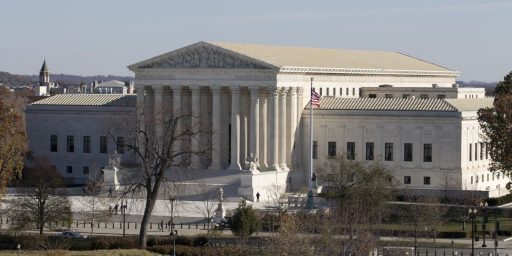Deadlocked Supreme Court Leaves Obama’s Immigration Relief Plan Blocked
Thanks to a 4-4 tie, President Obama's temporary immigration relief program remains blocked by a Federal Court Injunction.
The impact of a Supreme Court with only eight members was felt again today when the Supreme Court handed down a 4-4 decision in United States v. Texas, the case challenging the Obama Administration’s use of Executive Branch power and discretion to grant temporary relief from deportation for a select group of illegal immigrants. The result of this tie is that the decision below placing a stay on implementation of the program remains in effect and that it is unlikely that the program will be implemented during the remainder of Barack Obama’s Presidency:
WASHINGTON — The Supreme Court on Thursday announced that it had deadlocked in a case challenging President Obama’s immigration plan, a sharp blow to an ambitious program that Mr. Obama had hoped would become one of his central legacies. As a result, as many as five million undocumented immigrants will not be shielded from deportation or allowed to legally work in the United States.
The 4-4 deadlock, which left in place an appeals court ruling blocking the plan, amplified the already contentious election-year debate over the nation’s immigration policy and presidential power.
The case, United States v. Texas, No. 15-674, concerned an executive action by the president to allow as many as five million unauthorized immigrants who are the parents of citizens or of lawful permanent residents to apply for a program that would spare them from deportation and provide them with work permits. The program was called Deferred Action for Parents of Americans and Lawful Permanent Residents, or DAPA.
Mr. Obama has said he took action in 2014 after years of frustration with Republicans in Congress who had repeatedly refused to support bipartisan Senate legislation to update immigration laws. A coalition of 26 states, led by Texas, promptly challenged the plan, accusing the president of ignoring administrative procedures for changing rules and of abusing the power of his office by circumventing Congress.
“Today’s decision keeps in place what we have maintained from the very start: one person, even a president, cannot unilaterally change the law,” Ken Paxton, the Texas attorney general, said in a statement after the ruling. “This is a major setback to President Obama’s attempts to expand executive power, and a victory for those who believe in the separation of powers and the rule of law.”
For Mr. Obama, the ruling is a rebuke to his go-it-alone approach to immigration and effectively blocks any hope that his administration could protect millions of immigrants from the threat of deportation before he hands the presidency to his successor.
In a brief statement from the White House, President Obama said the ruling is a deep disappointment for the millions of immigrants who will not be able to emerge from the threat of deportation for at least the balance of his term.
“Today’s decision is frustrating to those who seek to grow our economy and bring a rationality to our immigration system,” he told reporters before heading to the West Coast for a two-day trip. “It is heartbreaking for the millions of immigrants who have made their lives here.”
Mr. Obama said the White House does not believe the very brief ruling from the court has any effect on the president’s authority to act unilaterally. But he said the practical impact will be to freeze his efforts on behalf of immigrants until after the November election.
“Now, we have got a choice about who we are going to be as a country and what we want to teach our kids,” Mr. Obama said. A moment later, he added, “In November, Americans are going to have to make a decision about what we care about and who we are.”
He also said the ruling is a stark reminder of the Republican refusal to consider Judge Merrick B. Garland, the president’s nominee to the Supreme Court. He said the court’s deadlock on the immigration case is proof that the Republican strategy is not “sustainable” over the long run.
He also predicted that lawmakers will eventually act to overhaul the nation’s immigration system.
“Congress is not going to be able to ignore America forever. It’s not a matter of if, it’s a matter of when,” he said. “We get these spasms of politics around immigration and fear-mongering, and then our traditions and our history and our better impulses kick in.”
The outcome in this particular case was hardly surprising in the wake of Justice Scalia’s death in February. At that time, the case was scheduled for argument in April and, when Court had accepted the case it designated an additional question for the parties to deal with in their briefs that, at least in theory, could have resulted in a broad ruling that dealt with not just the legality of this program but also the manner in which President Obama and many of his recent predecessors have used purported Executive Branch authority to expand the power of the Presidency beyond that which is permitted by either Federal Law or by Article II of the Constitution. Many observers took that as a sign that there was at least some support on the Court for what could have been a sweeping ruling that would have had broad implications going forward. With Justice Scalia’s death, though, the odds that the Court would be able to cobble together a majority based on the original scope of the decision released by the Fifth Circuit became almost non-existent. At the conclusion of oral argument in April, it was apparent that this is exactly the case and, as I noted at the time, the most likely outcome in the case was either a 4-4 tie or a ruling on the issue of standing that found that the states did not have the authority to bring this lawsuit from the start. As it turns out, the Justices were apparently unable to reach an agreement even on that issue, although the fact that it took two months for this tie decision to be released suggests that there was at least some effort to try to come up with an outcome that would get majority agreement.
So, here’s where we stand in the wake of today’s non-decision decision. Basically, it means that DAPA, the name given for the set of executive actions implemented by the Obama White House in November 2014 that allowed certain qualifying people who are in the country illegally to receive temporary relief from immigration, principally this consisted of the parents of children who were born in the United States and other qualifying groups of people deemed to be a low priority for deportation, remains on hold pursuant to the stay issued by the U.S. District Court and affirmed by the Fifth Circuit Court of Appeals. The case itself goes back to the District Court for whatever further proceedings are necessary for a final hearing on the merits of the case, which at some point will result in a ruling by the same Judge on a Permanent Injunction. From there, the case would again likely be appealed by the losing party to the Fifth Circuit, which has already upheld the District Judge’s temporary injunction. From there, the case would likely head to the Supreme Court yet again for a final ruling if the Court grants an appeal at that point. That hearing would include consideration of not only the merits of the case but also the standing issue that remains unresolved as a result of today’s ruling. Additionally, since I’ve seen some confusion on the issue, the program impacted by today’s ruling should be distinguished from another immigration relief program implemented by the Obama Administration. That program, known as DACA, provides temporary relief from deportation to people brought to the United States as minors by their parents who have not committed any crimes or violated any other serious laws. That program was not impacted by the District Court injunction and remains in effect to this day.
Incidentally, given President Obama’s statement this afternoon on this case, it is important to note that the 4-4 outcome in this case cannot reasonably be blamed on the Senate GOP’s refusal to consider the nomination of Judge Merrick Garland to replace Justice Scalia on the Supreme Court. President Obama did not appoint Garland until mid-March of this year. Even if the Senate had acted as expeditiously as possible it is extremely unlikely that they could have or would have been able to have a vote on Garland’s nomination in time for him to be fully briefed and prepared for oral argument in this case within a month after his nomination was put on the table. Additionally, given that this was a ruling on a Preliminary Injunction and that further action in the case in the courts below was awaiting Supreme Court action, it seems unlikely that that the Justices would have been inclined to delay a hearing in the case to wait for confirmation of a ninth Justice. There are good arguments against the “No Hearings, No Votes” position the GOP has taken, the ruling today is not one of them though.
With the rulings released today, there are three cases left to be handed down, including cases dealing with abortion and the corruption conviction of former Virginia Governor Robert McDonnell. The next opinion day is Monday, and it’s likely we’ll get all three then or that the Court will use one more day next week to hand down opinions. In any case, the term is almost finished.







Yet another reason for Hispanics to vote for Hillary in November…
Jan Brewer took quite a victory lap on this one. The divorce from reality is confounding.
@Tony W: Especially in the comments on Brewers statement. How do we maintain democracy when something like, say 27% of the electorate are completely off in some Bizarro World? And the Republican Party embraces them?
This is the case where Justice Department attorneys repeatedly lied to the judge, and got caught. He was going to order the program put on hold, and they assured him it was already on hold and wouldn’t go forward. They were lying. The judge found out about it, and gave them an order putting the problem on hold. They said oops, our bad, it’s really on hold now. They were lying again. That’s when the judge got mad and ordered every Justice Department attorney to undergo outside ethics training, as obviously they had skipped the part about “you don’t lie to a judge in court.”
And the main point of this suit was to tell Obama that he doesn’t get to rewrite the laws, but rather he shall take Care that the Laws be faithfully executed. (Where have I heard that phrase before?)
@Jenos Idanian: See my comment above. @gVOR08: There’s an entire industry devoted to feeding them cherry picked factoids that allow them to feel they have some little known deep insight.
@gVOR08: Oh, I saw your comment above. It was generalized ego-stroking and virtue-signaling. Whereas my comment cited actual events and facts.
The Obama Justice Department repeatedly lied to the Court, and got smacked down for it. And the crux of the Obama administration’s argument is that if it doesn’t like a law (in this case, existing immigration law), it can essentially rewrite it to suit their own vision. And while it would be nice if Congress would act at his behest, it’s really not that necessary. He openly said that he had to act because Congress had “failed” to pass a bill that he liked, so he just did what he wanted anyway.
That ain’t how it’s supposed to work. And it ain’t going to work.
I will admit I was a little saddened by this. I was looking forward to future Republican presidents using this as a precedent in other ways:
1) Ordering the IRS to stop collecting capital gains taxes in excess of 10%.
2) Ordering the IRS to cease any attempts to verify health insurance status under ObamaCare, and directing them to waive any pursuit of people who lie about their health insurance on their income tax forms.
3) Directing the Justice Department to refuse any action or assistance to any matters relating to gay marriage.
That’s just three ideas off the top of my head. But the potential applications of this precedent were mind-boggling.
Oh, I have more ideas:
4) There will be no prosecutions under the Clean Air Act or Clean Water Act.
5) There will be no fines or taxes levied based on Corporate Average Fuel Economy violations.
That’s enough for now, I think…
Thankfully we won’t have to worry about that for at least another 4 1/2 years, if not longer…
@An Interested Party: Pride goeth before a fall…
@Jenos Idanian: For false messiahs and false prophets will appear and perform great signs and wonders to deceive, if possible, even the elect…
I wish this had been a majority decision against the President and am disappointed with the liberal bench. While I agree on the substance of what Obama did, It looked to me like he had exceeded his authority to do it. And if we give Obama the power to control immigration law through executive action, we give it to Trump too.
@Hal_10000: GOPs have been claiming for 7 years that Obama thought he was “above the law”, “acting as a king”, “a dictator” for even the most routine use of executive discretion. Next time they have the presidency, they’ll grab every power they can get away with. Nothing Obama actually does, or doesn’t do, will make any difference.
I wish that Congress would decide what they want for immigration reform and fund the enforcement provisions that we have currently in place instead of playing politics with matters that make a significant impact on our national character and our relationships with the other countries of the world. I don’t expect to get what I wish for, so I’m not disappointed when it doesn’t happen any more.
@Jenos Idanian:
Maybe nitpicking, but he actually said ‘because Congress had failed to act at all‘.
I live in an about 80% Mexican American community with very low crime and very hard working and friendly neighbors. There are only two Jewish households, including mine in this community, where even White people are a real minority. I think my Mexican neighbors are excellent neighbors!
@gVOR08:
I agree. Many of the same ones complaining about Obama’s executive overreach stood around like toilets with the lids up while Bush did the same or worse. I hit them on that at the time. And I’ll hit them when they do it again.
One reads repeatedly that Congress has funded the Customs and Immigration people at a level that allows 450K deportations per year. Apparently (meaning I read it in the media and no one has disputed it that I know of) the applicable immigration law REQUIRES the executive branch to prioritize who of the 11M undocumented visitors gets to join in that 450K.
The actual impact of the case seems to me that those folks who would have been in the DACA program now have no work permits and drivers licenses. I don’t see anything here that makes it more likely that a long-term undocumented visitor who does not come to the attention of law enforcement and is the parent of a US-born child is more will be deported.
It is obvious that the lack of a drivers license is a significant hassle. And that a green card or a DACA identification card (was there such a thing?) would make their lives feel much more secure. And it’s obvious that the social disruption of 11M ‘invisible’ people in our midst is a problem that Congress could solve if the will existed.
But the imaginings of so-called-conservatives that the Kenyan in the White House has staged some kind of coup is such obvious bullpucky that surely, surely even they do not believe it.